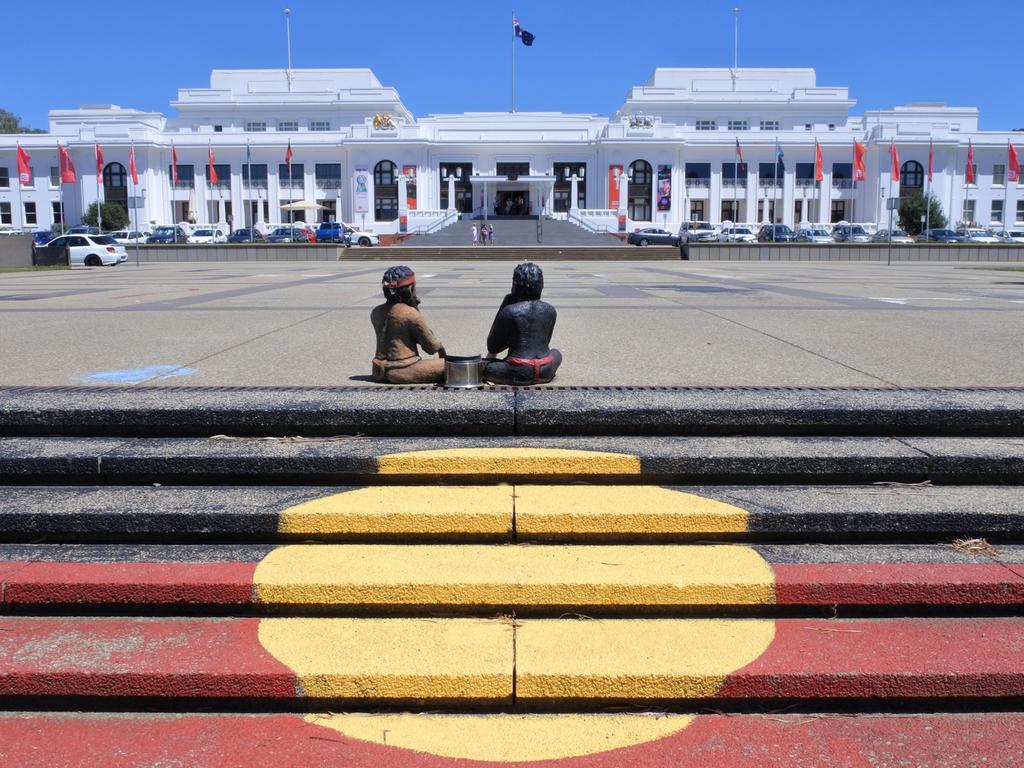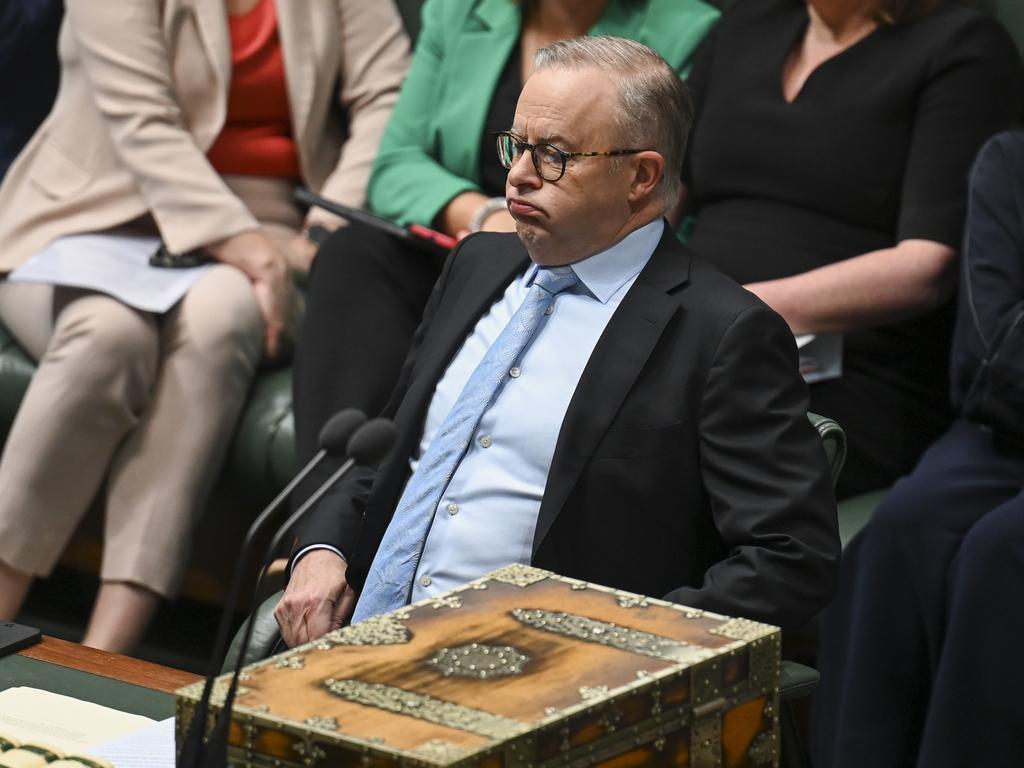The voice was defeated … So, why do we carry on accepting Indigenous separatism across our institutions?


Notice how, in our public discourse, almost no one refers any more to “Aboriginal people”. Instead, there has been a steady shift in nomenclature – at least by most of the media and officialdom – from the term Aboriginal and Torres Strait Islander peoples, a simple description, to the term First Nations people, which implies a particular status.
This intellectual sleight of hand has continued apace, entirely uninterrupted by the smashing defeat of the voice.
First, “Aboriginal people” became “Australia’s first peoples”, as in the First People’s Assembly of Victoria. More recently they’ve become “First Nations people”, as in the ambassador for First Nations people, which was one of the first moves by the then new Albanese government. That’s hardly surprising, as implementing the Uluru Statement from the Heart “in full” – voice, treaty and truth – was the very first commitment that Anthony Albanese made on winning the federal election in 2022.
It’s just that the Uluru statement, far from being the gracious invitation to walk the road to reconciliation together, as the Prime Minister repeatedly claimed, is actually deeply subversive of national unity. It reads: “Our Aboriginal and Torres Strait Islander tribes were the first sovereign nations of the Australian continent … and possessed it under our own laws and customs … This sovereignty … has never been ceded or extinguished and co-exists with the sovereignty of the Crown.”
But the term nations implies sovereignty and the term sovereignty implies power. In other words, notwithstanding they’re part of Australia, each Aboriginal “nation” is “sovereign” in the sense of having its own authority to govern itself.
When the voice referendum was resoundingly defeated last year, 61 per cent to 39 per cent, most Australians would have expected some official recognition that the electorate had spoken and decisively rejected the Indigenous separatism inherent in the Uluru agenda. But the Albanese government has never definitively ruled out a legislated voice; is still committed to treaties (even if these are to be negotiated between “First Nations” and the states); and still has $6m in the budget for Makarrata or a so-called truth-telling commission.

Moreover, whenever he’s talking about Aboriginal people, the Prime Minister (and all his ministers) habitually use the term First Nations despite its implications for who is really entitled to call the shots in modern Australia.
The Australian Public Service Commission website advises that the government’s “preference” is to use the term First Nations people. The Walking Together Reconciliation Committee says the terms Aboriginal and Indigenous “fail to represent unique cultures”.
As for the term First Australians, it notes that “some take issue with the reference to ‘Australia’ as it compromises sovereignty for the first people that existed before ‘Australia’ came to be”. By contrast, the term First Nations, says the committee, “recognises Aboriginal and Torres Strait Islander peoples as the sovereign people of this land” and is thus a “better choice” than other “outdated and offensive terms”.

Despite spending millions on a voice proposal that their customers and their staff, by and large, didn’t support, woke public companies such as Qantas and Virgin still acknowledge the “traditional owners” whenever a plane lands; and still welcome Australians to the country of the relevant Aboriginal clan rather than to the city or town that belongs to everyone.
Likewise, despite the voice referendum’s defeat, just about every building and landmark in the country, with more than one flag pole, continues to fly the Aboriginal flag co-equally with the national flag, as if the flag of some of us should have equal honour to the flag of all of us.
When voice architect Marcia Langton said there would be no more “welcomes to country” if the voice failed, many Australians quietly cheered. In the event, though, other than a handful of local councils that said they would end the practice, welcomes to country remain commonplace.

Last week, a Victorian barrister, Lana Collaris, publicly rebuked the Victorian Bar Council in these pages for its habitual acknowledgment of the “traditional owners” at the start of every meeting. There’s a particular problem with the term First Nations, she added, which “is wrongly used to strengthen the claims of the ‘sovereignty was never ceded’ and ‘always was, always will be’ movement”. She warned that this was leading to a “two-tiered legal system based on race”.
In response, Victorian Bar president and Bar Council chairwoman Georgina Schoff KC insisted that she would continue to acknowledge “the peoples of the Kulin Nation, the traditional owners of the land where we meet at Owen Dixon Chambers in William St, Melbourne” and cited judicial acknowledgments of Aboriginal people’s connection with country.
No doubt this practice was originally intended as a simple courtesy, a mark of respect, and perhaps an acknowledgment that Aboriginal people haven’t always been treated as well as they should have been in their own land. The problem, though, is the clear inference that ownership has never legitimately transferred.
Chris Merritt, from the Rule of Law Institute, has said that First Nations talk is “a modern fairytale that does more harm than good”. He points out that former High Court chief justice Harry Gibbs said: “There is no Aboriginal nation, if by that expression is meant a people organised as a separate state or exercising any degree of sovereignty”. Another former chief justice, Anthony Mason, said the Mabo case “is entirely at odds with the notion that sovereignty, adverse to the Crown, resides in the Aboriginal people of Australia”.
There are two good reasons why Australian jurisprudence, contrary to current fashion, has never acknowledged Aboriginal nationhood or sovereignty. The first is that the 500-plus clans or tribes that occupied the Australian landmass in 1788 were quite different from the emerging nation-states of Europe, with no formal systems of government and no clearly defined territory.

It may not have been terra nullius but it certainly wasn’t organised, even in the way of the islands of New Zealand at that time, or the Native Americans in the US.
The second is that a retrospective acknowledgment of sovereignty or nationhood would imply the need for some form of atonement or reparation for its loss.
And that’s the whole point, isn’t it? Compensation is exactly what the activists want by demanding the use of First Nations terminology. And that’s exactly what Labor governments will ultimately surrender to if they keep pandering to this linguistic shift. It is why I was so determined to expose the full agenda of the Uluru statement, which at page 19 referred to “reparations” and “a financial settlement (such as seeking a percentage of GDP)”.
What’s becoming clear is that it wasn’t nearly enough simply to defeat the voice. As long as our mental landscape is dominated by the various manifestations of Aboriginal separatism – the First Nations talk, the welcomes to country and the different flags – the voice referendum will simply be a battle won in the lost war for one Australia.






As George Orwell recognised, one of the left’s tricks is to use loaded words as a form of moral intimidation. As he wrote in Politics and the English Language, “political chaos is connected with the decay of language” that’s “designed to make lies sound truthful … and to give an appearance of solidity to pure wind”. It’s this “slovenliness of our language”, he said, that “makes it easier to have foolish thoughts”.